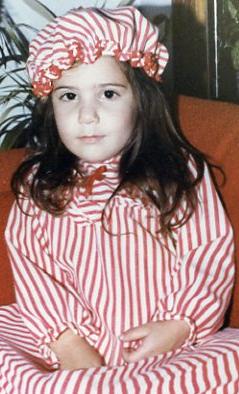
One part of the bedtime ritual of my older daughter Elissa was to drink a small glass of juice, served in a brightly colored opaque plastic cup. Now that I think of it, I don't know why we were serving her juice just before bedtime, which seems like a bad idea on at least a couple of counts, but there you have it. I used to fill the cups using magic. Well, more like slight of hand. We actually had several identical cups in each color, and I would make use of two of them. I would hide one, filled with juice, near the bed, and bring in the other one empty. I would be sure that Elissa saw that the cup was empty, but at some point, I would surreptitiously swap it for the other, filled cup. I might go on pretending it was still empty for quite a while, a form of misdirection. Then eventually, I'd wave my hands over the cup, say some magic incantation, and show Elissa that I had magically produced juice. Elissa seemed for a while to believe that I was filling the cup magically. But eventually, I found her looking around, trying to figure out how I was really doing it, and I knew that she had realized that it must have been a trick. Elissa recently reminded me that I used to make a honking sound when she pushed my nose. But one day, after producing a few honks, she made another motion towards my nose, but unexpectedly stopped short of actually touching it. Expecting the poke, I honked. Elissa had experimentally determined that it wasn't actually the nose press that was producing the sound. Perhaps this episode started her on the path towards being the experimental scientist she eventually became. Note 2
Elissa was also wowed the first time we took her into Boston to see a musical comedy (I can't remember if it was Peter Pan, or Annie). She already knew the songs from the album, and of course was aware that the singing was accompanied by music. When we got to our seats, I asked her if she knew where the music came from. Elissa guessed that there must be a sound system, perhaps a record player, behind the stage. "No," I said, "there's a big hole in front of the stage, with an entire orchestra in it." Elissa knew an absurd story when she heard one. "No", she scoffed. When I walked her up to the front, and we looked down into the orchestra pit, I think she could hardly believe it. One amazing thing about watching children grow up is seeing them slowly acquire all the knowledge we have as adults. Poking at a piece of roast beef one day, Elissa complained about the juices running around her plate, asking, "What is this stuff, anyway?" I replied, "Well, it's actually blood from the animal." Elissa, it turned out, was stunned, saying, It hadn't dawned on me that she didn't already know this. I could almost watch the wheels turning. "OK, OK," she said, "what kind of animal is a "beef" animal? "A cow", I replied. Elissa: "We eat cows ?!!" Some more thought. "When we eat 'chicken', are those the same chickens we see running around at Drumlin Farm?" "Yes", I replied. Elissa: "We eat chickens ?!!" It took a number of years, but she's now a vegetarian. Well, she eats fish. She'll eat anything she would be willing to kill herself. Note 5 One more story about Elissa believing in magic, and specifically, in Santa Claus. Seems harmless, except she realized that if Santa Claus could get into the house through the chimney, anybody could. This clearly left us vulnerable to robbers and other such bad people, which panicked Elissa. Much as we tried to explain this away by various means, she was still terrified. Eventually, we felt forced to let her know that the Santa Claus story was just a myth, and it really wasn't possible to get into the house via the chimney (we didn't go into how many other ways could be used to gain access). This satisfied her, but caused some amount of consternation when she repeated it to her friends (we had neglected to tell her to keep this secret to herself). The mother of one of these friends later told us that her son had one day asked, "If I get married some day, will it be to someone I know now?" Her mother replied that it could be, but probably not. He persisted, "Will I have to marry Elissa?" His mother told him "No", but then wondered aloud why he might be concerned about marrying Elissa, in particular. "Well, Mom," he said, "you know her views on Santa Claus." I guess these mixed marriages are tough.   Note 1: Some might speculate that the horrifying discovery that one's father is just an ordinary person, and not an all-powerful protector, is what led to the invention of God, the "heavenly father", as a more capable replacement. [return to text] Note 2: One of Elissa's friends tried the same sort of test on the "tooth fairy". When one of her teeth fell out, she put it under her pillow without telling anyone, and found the next morning that the "tooth fairy" had not visited. When she then informed her family the next day that the tooth had fallen out, it was replaced the next morning with a monetary reward. The Boston Globe reported a similar case under the heading "Tooth Fairy Test" in its "G Magazine" on Sunday, November 14, 2010. But upon discovering that the Tooth Fairy was, in fact, her father, the 8-year-old girl asked, "Is he the tooth fairy just for us, or for the entire world?" [return to text] Note 3: In college, I had my old reliable Olympia portable typewriter modified to type French accented characters. Made by the Olympia Werke AG. in Wilhelmshaven, Germany, it was 100 percent reliable. But it's now another piece of obsolete technology, of no use to me in the computer age. Touch-typing was one of the more practical skills I learned in High School, serving me well to the current day. Elissa also later learned touch-typing in High School. But by the time my younger daughter Sara got to high school, the class had been watered down to "Keyboarding" (many fewer hours), which I think was a significant loss. In high school, I also studied "Radio Workshop" (how to put on radio dramas) and "Typesetting" (with moveable lead type), two skills which have not stood the test of time. [return to text] Note 4: "Clarke's third law", from Profiles of The Future, 1961 [return to text] Note 5: It is commonly pointed out that while the English names of animals are generally of Germanic origin, the names of foods are often Latin-based, via French. After the Norman conquest in 1066, the common people spoke a Germanic precursor of English, while the ruling class spoke old Norman French. Hence our modern word for "cow" is related to the modern German "Kuh", while our word "beef" is related to the modern French "boeuf". [return to text]  |

 Elissa was quite a bit older when one day, she decided, for mysterious reasons, to type a piece of school homework, instead of submitting it in handwritten form. Perhaps she just wanted to play with my portable typewriter, but after a while, I noticed that her hunt-and-peck typing was taking quite some time. Since she had already completed the required work, and the typing was just an afterthought, I offered to finish the job for her. She watched as I set up her handwritten text on a stand. Then, my eyes fixed to the text, I began typing it at a pretty rapid pace, and Elissa's jaw dropped. She was stunned, and exclaimed, "You're not even looking at the keys!"
Elissa was quite a bit older when one day, she decided, for mysterious reasons, to type a piece of school homework, instead of submitting it in handwritten form. Perhaps she just wanted to play with my portable typewriter, but after a while, I noticed that her hunt-and-peck typing was taking quite some time. Since she had already completed the required work, and the typing was just an afterthought, I offered to finish the job for her. She watched as I set up her handwritten text on a stand. Then, my eyes fixed to the text, I began typing it at a pretty rapid pace, and Elissa's jaw dropped. She was stunned, and exclaimed, "You're not even looking at the keys!"